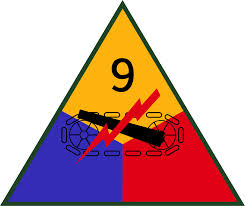Roger Shinn was born on January 6, 1917 and was from Germantown, OH. He was a Company Commander in the 60th Armored Infantry Battalion, 9th Armored Division and fought at the Battle of the Bulge.
FROM FIND A GRAVE:ROGER L. SHINN JAN. 6, 1917 - MAY 13, 2013 PROTESTANT PASTOR LINKED FAITH TO SOCIAL CAUSES
Pittsburgh Post-Gazette (PA) - Thursday, June 6, 2013
The Rev. Roger L. Shinn, an educator, administrator and author who championed the ecumenical movement and social activism in Protestant churches as their growth peaked in the 1950s and '60s, died May 13 at his home in Southbury, Conn. He was 96.
Perhaps Rev. Shinn's signal moment came after the 1957 merger of two mainstream denominations, the Evangelical and Reformed Church and the Congregational Christian Churches, to form the United Church of Christ. He was the principal author of the statement of faith for the denomination, which is still used in words close to his original. (References to God as a male, for example, have been made gender-neutral.) Rev. Shinn's personal journey included fighting in the Battle of the Bulge as an infantryman in World War II and winning a Silver Star for valor. He later counseled conscientious objectors during the Vietnam War.
At Union Theological Seminary in New York City, Rev. Shinn studied with giants of 20th-century religious thought -- Dietrich Bonhoeffer, Reinhold Niebuhr and Paul Tillich -- and was himself later the Reinhold Niebuhr professor of social ethics at Union.
He helped shape the flurry of theological debate that followed World War II, arguing for a sharper sense of ethical and social responsibility on the part of moderate Protestant churches (Methodists, Presbyterians, Congregationalists, Episcopalians and kindred denominations) whose membership peaked in the early 1960s at 31 million.
The discussion reflected a gnawing need to make sense of a postwar world so emptied of certainties that many clergy members felt compelled to offer evidence on why God still lived.
Rev. Shinn's answer to the "Is God dead?" question was that old ideas of God died repeatedly. "But it is not God who is changing," he said in a 1966 interview with The Boston Globe, "only our own concepts and broadening cosmic horizons."
Gary Dorrien, the current Reinhold ethics professor at Union, said in an interview that Rev. Shinn's 15 books asked more questions than they answered, but that those questions were indisputably large: "What's going on? How should we think about it? How do we include voices in this conversation that have been excluded previously?"
Rev. Shinn's books discussed, among other topics, death, war, the nature of history and the usefulness of existentialism to both believers and nonbelievers.
The statement of faith for the United Church of Christ called on believers to "resist the powers of evil," an implicit endorsement of the social activism that became a hallmark of the new church and much of mainline Protestantism. Their causes included fighting for civil rights, protesting the spread of nuclear weapons and working to alleviate hunger.
J. Martin Bailey, former editor of The United Church Herald, said in an interview that the document echoed Bonhoeffer's call for believers to find God in their own lives. Rev. Shinn wrote that those who trust in God are promised "courage in the struggle for justice and peace" and eternal life.
Roger Lincoln Shinn was born in Germantown, Ohio, on Jan. 6, 1917. He graduated from Heidelberg College (now University) in Tiffin, Ohio, in 1938, and from Union in 1941. As managing editor of a student journal, he persuaded Albert Einstein to write an article on science and religion.
He was ordained in 1946 and taught as an instructor at Union for two years before becoming a professor at Heidelberg, then at Vanderbilt University in Nashville. He returned to Union in 1960 as a professor. He was dean of instruction from 1963 to 1970, and from 1974 to 1975 he was acting president after Bishop J.Brooke Mosley was forced out. Donald W. Shriver Jr. succeeded him.

PRIVATE CITIZENS SUPPORTING AMERICA'S HERITAGE
American
War Memorials Overseas, Inc.
War Memorials Overseas, Inc.
Shinn Roger Lincoln
Name:
Roger Lincoln Shinn
Rank:
Captain
Serial Number:
Unit:
60th Armored Infantry Battalion, 9th Armored Division
Date of Death:
2013-05-13
State:
Ohio
Cemetery:
Plot:
Row:
Grave:
Decoration:
Comments:
